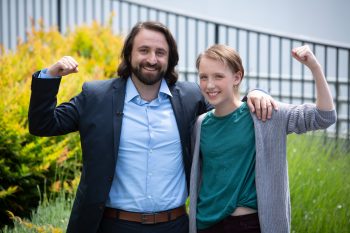An innovative clinical trial led by Dr. Nicholas Vitanza, a neuro-oncologist at Seattle Children’s, shows promise that delivering cancer-fighting chimeric antigen receptor (CAR) T cells directly to the brain for children and young adults with recurrent or refractory brain and central nervous system (CNS) tumors may be feasible and tolerable.
The results, published today in Nature Medicine, are the initial findings from Seattle Children’s Therapeutics’ BrainChild-01 immunotherapy clinical trial. BrainChild-01 is the first of three such trials seeking to comprehensively target all types of pediatric brain and spinal cord tumors.
Seattle Children’s Therapeutics is a unit in the research division at Seattle Children’s and is taking promising CAR T cell immunotherapies forward to the first clinical trials of their kind for children. As a novel non-profit therapeutic development enterprise, it is devoted to envisioning and testing next-generation cell and gene therapies for pediatric diseases, so children have the medicines they deserve.
“This research is still in its early stages, but promising signs suggest that our approach may be safe,” said Vitanza. “We are committed to not only finding cures for children and young adults with CNS tumors, but to offer more tolerable treatments with fewer long-term side effects.”
Brain and spinal cord tumors are the most common cancer of childhood, accounting for approximately one out of four childhood cancers. Each year, more than 4,000 brain and spinal cord tumors are diagnosed in children and teens. Some of these tumors have a high fatality rate.
CAR T cell immunotherapy is an experimental treatment that stimulates the immune system to fight disease. The treatment reprograms T cells (white blood cells in the immune system that fight disease) to engage and to kill cancer cells. In this trial, the treatment targets the Human erb-b2 receptor tyrosine kinase 2 (HER2) protein on cancer cells for children and young adults with limited treatment options. The protein is expressed by many common brain tumors in children. The T cells are given directly into the CNS space by infusing into the fluid that surrounds the brain and spinal cord, or into the cavity after tumor resection. T cell doses are given weekly, primarily in the outpatient setting.
In initial results published today, the researchers detail a preliminary assessment of their phase I clinical trial, making them the first group to publish initial findings on the viability of repetitively delivering CAR T cells directly to the brain in children and young adults.
The study aims to eventually answer a range of questions, primarily whether it is safe to deliver repetitive doses of T cell therapy into the brain or the fluid that surrounds the brain and spinal cord of children or young adults. It also aims to assess the best dose of therapy for children and young adults with CNS tumors, and it seeks to answer whether T cell therapy works against brain and CNS tumors.
The approach “supports the feasibility of generating HER2CARs for repeated dosing regimens and suggests that their repeated CNS delivery may be tolerable,” authors wrote in the study.
Additionally, in the BrainChild-01 study, researchers found evidence of a CAR T cell generated inflammatory response in patient’s cerebrospinal fluid (CSF) and one patient had neuroimaging findings of local immune activation just after CAR T cell dosing. Other advanced correlative studies are ongoing to better understand how well and for how long the CAR T cells are fighting the tumor.

“This research is terrific news for kids like me, who fear the possibility of a relapse with no known treatment,” said Avery Berg, who was previously treated for a rare, aggressive brain cancer at Seattle Children’s and remains cancer free. “This trial provides hope on the horizon for a potential new treatment option for kids with brain cancer.”
Seattle Children’s is an international leader in the effort to better treat cancer in children, adolescents, and young adults by equipping the immune system with the ability to recognize cancer cells as targets. It has the most comprehensive pediatric CAR T cell immunotherapy program in the world, meaning it treats more types of childhood cancers using CAR T cell therapies than any other facility.
Along with BrainChild-01, Seattle Children’s has two additional open clinical trials for relapsed or refractory CNS tumors, BrainChild-02 and BrainChild-03. BrainChild-03 includes patients with diffuse intrinsic pontine glioma (DIPG), a universally fatal brain tumor. The BrainChild-03 study is one of the first CAR T cell trials in the United States for children with DIPG and was the first study to repeatedly dose CAR T cells intracranially to a child with DIPG. It is open to patients with DIPG at any time after their initial standard radiation, including after their tumor progresses.
All three BrainChild studies are now open and enrolling, says Vitanza, who is the principal investigator for the BrainChild-01 and BrainChild-03 trials, with nearly three dozen children and young adults enrolled across all studies.
Seattle Children’s CAR T cell immunotherapy research and the BrainChild clinical trials are supported by a community of generous donors.

